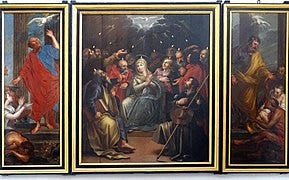The Season after Pentecost Isn't Ordinary
Commentary/Reflection
Growing up in a New Order parish, I remember always looking forward to certain times of the Church year. I loved the Advent and the Christmas seasons and remember also looking forward to the Lent and Easter seasons. But I was always disappointed when the Easter season ended and we were left with months of “Ordinary Time.” Ordinary time seemed, well, so ordinary and boring. It was the time when nothing interesting happened.
Years later when I went away to graduate school, the parish my wife and I attended was run by a group of Oratorians. One of them seemed to feel the same thing I had felt growing up about the end of the Easter season. Every year, the Sunday after Pentecost, he would preach a version of the same homily, telling us, “Ordinary time is anything but ordinary.” He tried. And to this day, I am grateful he tried. And yet, he struggled to convince.
It was only years later that I learned that Ordinary Time had not always been named “Ordinary Time” (ostensibly after the “ordinal” numbers). It was one of those changes that came with the modifications to the Church calendar in the years following the Second Vatican Council. Before then (and still today in Churches that continue to use the pre-1962 Calendar), weeks were not counted as “Xth Sunday in Ordinary Time,” but as the “First/Second/Third Sunday after Pentecost.” And that change was of more than minor importance.
If labeling Sundays as merely Sundays in “Ordinary Time” inevitably made them seem boring and untethered to any real season in the Church Calendar at all, the traditional system of recognizing time by relation to Pentecost was vastly different. Rather than seeming like extra Sundays when nothing interesting was happening, tethering the Sundays and season after the Easter Season to Pentecost linked them clearly to a new and specific season of the life in the Church and in Scripture.
Our Lord had ascended to heaven; the time to specifically celebrate the Resurrection was over. The Gift of the Holy Spirit; the Advocate of Whom He had spoken, had been granted to the apostles and their followers. Freed from fear by that gift, their task was to “go to all nations, baptizing them in the name of Father, Son, and Holy Ghost.”

Linking the season after Easter to Pentecost by labeling them “Sundays after Pentecost,” is a crucial reminder that we are now ourselves living in the season and time after Pentecost. Our Lord has ascended to heaven and he has left us a task: to spread the Gospel to all nations, to live as a people who have received the Holy Spirit and no longer cower in fear and uncertainty in the Upper Room.
This is the life we are to live now. Venerable Archbishop Sheen used to say that the task of the Christian laity is to live our lives such that, by them, the glory of God is made manifest. The task may not seem an easy one in the world today. We sometimes seem surrounded by forces larger and stronger than we are: a world that rejects God, demands we celebrate almost every perversion, and even a Church that, at times, seems little bulwark against the world’s evils.
And yet we are not to despair. We remember after Pentecost that our times are no worse than those the early Apostles lived in after their Master’s Ascension. A dozen peasants faced the entire Roman empire and a religious leadership determined to silence them. But they could no longer cower in the upper room. They received the Holy Spirit and their lives were never the same again. So with us. We are to no longer cower in the upper room. We are living in the season after Pentecost, manifesting God’s glory through our lives.
Come Holy Spirit, fill the hearts of your faithful and kindle in them the fire of your love. Send forth your Spirit and they shall be created. And You shall renew the face of the earth.

